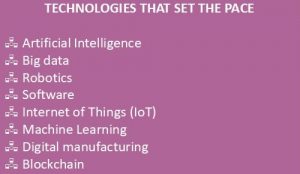The digital revolution is already here. The new online world represents a paradigm shift driven by technology, connectivity, and data, with profound implications for individuals, societies and, of course, companies.

Until the advent of digitalization, corporate strategies had been based on the creation of value, through efficient allocation of resources and excellence in processes and operations. An approach that is limited when adaptation to changes and innovations that management can hardly foresee is imposed.
The digital era has transformed the competitive environment and has forced a rethinking of strategy. The future has become more complex and unpredictable, but at the same time new doors have been opened to innovation, relationships with citizens, collaborators, and clients, and to the ability of organizations to adapt.
From a strategic perspective, digitalization means, on the one hand, moving from a focus on sales objectives to one that includes improving investment decisions to facilitate sustainable growth and operational efficiency.
On the other hand, those who manage organisations have access to more precise and up-to-date data on which to base their decision-making. For example, verified information on the key behaviour of employees, clients and consumers, such as that generated by Tarazaga’s EBMS software, which allows the design of human resources, marketing or workplace safety strategies and policies, accelerating corporate awareness processes. Today we already know from neuroscience that only 15% of the knowledge that people have is conscious, the other 85% is unconscious and determines our reactions and automatisms.
Digital transformation also provides new models of talent acquisition and management in organisations, such as remote work or collaboration tools, which increase people’s efficiency, commitment, and well-being.
Finally, technological metamorphosis makes it possible to develop more flexible, agile, and adaptable supply chains, or lays the foundations for stronger cybersecurity and risk management.
The digital keys of 2025
In 2025, the main trends leading the digital revolution are:
• The expansion of AI and Machine Learning;
• The increase of 5G networks and improved connectivity;
• The acceleration of cloud computing;
• The development of IoT ecosystems;
• The focus on cybersecurity, privacy protection and compliance;
• The growth of Extended Reality (XR) technologies;
• The success of no-code or low-code software development platforms, which allow non-experts to program;
• The application of blockchain in supply chain management;
• Greater investments in energy-efficient technologies, to reduce the carbon footprint and operating costs.
How to adapt to the digital challenge
Companies’ adaptation to the digital challenge involves managing change through innovation, generating digital spaces for collaboration, as different value chains, and delving into new technologies. This means:
1) Identifying the real needs of customers and collaborators;
2) Redesigning systems and processes, choosing the right technologies;
3) Creating an online platform, as an ecosystem that unites suppliers and customers, which implies digitalizing the company, improving data, and optimizing the customer experience;
4) Turning the organization into a digital knowledge centre, investing in technological training and the development of human teams.
In this context, managers will receive valuable assistance from artificial intelligence for data analysis, scenario design, and the formulation of action plans. Predictive analytics and governance supported by AI tools will improve the efficiency and transparency of decision-making processes. But the problem of probable algorithmic biases and the attribution of decision-making to machines must be resolved.
In this sense, some Artificial Intelligence applications will allow the generation of something new, even if it is based on past data. Because in life, two things never happen exactly the same way, new factors always appear that prevent the past from being projected into the future with an exact answer. Faced with this challenge, EBMS software, by incorporating this 85% of data from the collective unconscious, allows the discovery of something new and opens organizations to a leap in their decision-making.
At Tarazaga we have always thought that, in a world of overabundance of numerical, textual, or logical information, it is essential that those who oversee companies were able to extrapolate from big data what is useful for their organizations, smart data.
At the same time, companies need to undertake digital transformation in parallel with sustainability. There is a clear synergy between technological evolution and compliance with ESG (environmental, social and governance) principles. In this sense, the appropriate use of AI, the Internet of Things, and big data will contribute to improving operations, reducing waste, and optimizing energy efficiency, with a positive impact on the the health of the planet and its inhabitants.


